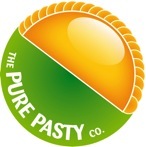Cornish Pasties have just received Protected Geographical Indication (PGI) status from the European Commission. That means only Cornish pasties made in Cornwall and following the traditional recipe can use the name “Cornish pasties.”
According to the EC press release:
A genuine Cornish pasty has a distinctive ‘D’ shape and is crimped on one side, never on top. The texture of the filling is chunky, made up of uncooked minced or roughly cut chunks of beef (not less than 12.5%), swede, potato, onion with a light seasoning. The pastry casing is golden in colour, savoury, glazed with milk or egg and robust enough to retain its shape throughout the cooking and cooling process without splitting or cracking. The pasty is slow-baked and no artificial flavourings or additives must be used. It must also be made in Cornwall.
 Super Chef went searching for Cornish pasties — and found delicious meat pies at Pure Pasty in Vienna, Virginia.
Super Chef went searching for Cornish pasties — and found delicious meat pies at Pure Pasty in Vienna, Virginia.
Owner Michael Burgess recount the history of the pasty:
The pasty was easy to carry and provided a hearty, substantial meal to keep a hardworking miner going all day long. When the tin in Cornwall was mined out, the Cornish miners emigrated all over the world and took their dish with them, including to parts of the U.S.
The best is the spicy Chicken Masala is wrapped in a flakey, warm pastry, and stuffed to bursting with organic chicken, potatoes and Indian spices. Super Chef also enjoyed the juicy Lamb Stew pasty – the pastry holds the filling well so there is no mess. There are also sausage rolls, pork pies, and even vegetarian pasties. Pure Pasty also makes an excellent tomato soup for starters. They ship pasties around the country – but they are best hot out of the oven.
Celebrate the new protected status with a great pasty.
(Image of Michael Burgess by Dayna Smith for The Washington Post)

1 comments on “Meat Pie Fad: Pure Pasty”